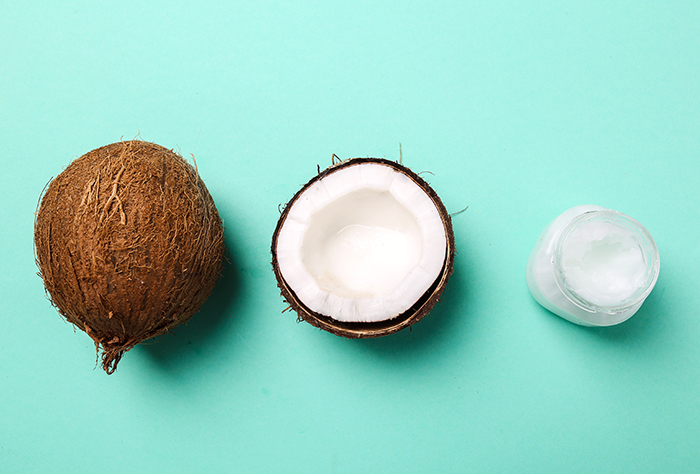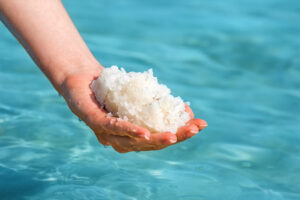How to Tell the Difference Between Nummular Eczema and Ringworm
It’s often difficult to distinguish between nummular eczema and ringworm, so it’s always best to be evaluated by a dermatologist, say experts.

Published On: Mar 15, 2018
Last Updated On: Oct 27, 2021
More than 50 percent of patients with eczema or their or caregivers reportedly incorporate complementary and alternative medicine (CAM) into their day-to-day eczema management. This high prevalence for CAM use in the eczema community is likely due to a constellation of factors.
Parents grow frustrated (and understandably so) with the chronicity and remitting nature of eczema. There are concerns about significant side effects with long-term “Western” medicine use, especially topical steroids, and the lack of targeted and safer options for more severe eczema cases.
Up until the past two decades, the use of CAM for eczema was based mostly on anecdotes. Even today, the quality of research evidence on CAM for eczema varies greatly. While some new research studies have good design and convincing results, others lack sufficient design.
Let’s take a look at some evidence-based CAM approaches and misconceptions of CAM for eczema.
Natural oil has been used in skin care for centuries. A good number of natural oils have beneficial fatty acids that help to repair the skin’s natural barrier, which is defective in patients with eczema.
But not all natural oils are good for our skin. Some can be irritating and may even worsen eczema. The plant source, composition and the ways that natural oils are extracted determine their benefit and harm.
Cold-pressed (also known as “virgin”) fixed oils are made by extracting oil from seeds or nuts without adding chemicals or heat, and therefore tend to be safer for skin use.
On the other hand, essential oils are extracted through steam-distillation of aromatic flowers or leaves. Heat and chemicals added during essential oil extraction can produce irritating compounds, and therefore should be avoided for skin use.
Several natural oils have been found to be safe and beneficial alternative moisturizers. Virgin coconut oil contains monolaurin, a fatty acid that mitigates Staphylococcus aureus (commonly known as the “Staph” bacterium) colonization that can typically develop in eczema patients.
Virgin coconut oil is also superior in improving eczema compared to mineral oil (the main constituent in commercially available baby oil). Virgin sunflower seed oil has anti-inflammatory properties to help soothe itchy and inflamed eczema skin, and can improve skin hydration and preserve the integrity of the skin’s natural barrier.
Jojoba oil and borage seed oil have also been studied with promising results and appear to be as safe as a moisturizer. However, not all natural oils are good to use on eczema skin. For example, olive oil can disrupt the skin’s natural barrier when used as a moisturizer. This is likely because it contains irritating fatty acids such as oleic acids.
Bathing in eczema patients can be quite an art form. Many of us may not realize that good bathing takes more than a tub of water and soap, and does far more than rinsing off dirt, grease and body odor.
Daily bathing rinses off substances such as irritants, allergens and germs that may flare eczema. That said, water and soap strips the natural oil that coats our skin surface and can make us more prone to eczema flares. Therefore, bathing for 10 minutes or less daily with lukewarm water and a limited amount of gentle soap is recommended.
There is ample research demonstrating that what lies in our bathwater can both benefit and harm eczema skin. A recent study found that bathing with hard water (high in calcium, magnesium, bromide and chloride) can increase skin deposition of an irritating chemical (sodium lauryl sulfate) that is commonly found in soaps, further irritating eczema skin.
It would make sense that installing water-softening machines might minimize the negative effects of hard water on eczema skin, but available research has not been able to prove this.
 Several additives in bathwater can improve eczema. The most well-known and widely used bathing additive is bleach. The recommendation by the American Academy of Dermatology (AAD) is to add a half cup of regular strength (6 percent) bleach to a full tub of water, or one teaspoon of bleach per gallon of water for babies.
Several additives in bathwater can improve eczema. The most well-known and widely used bathing additive is bleach. The recommendation by the American Academy of Dermatology (AAD) is to add a half cup of regular strength (6 percent) bleach to a full tub of water, or one teaspoon of bleach per gallon of water for babies.
Bleach baths should be taken for five to 10 minutes two to three times weekly followed by tap water to rinse off the bleach water. Bleach baths were previously thought to improve eczema by lowering bacterial counts on the skin surface, but recent research data have shown conflicting results.
It also appears that bleach may improve eczema by alternative mechanisms, such as directly decreasing itch sensation and skin inflammation.
Balneotherapy is the practice of bathing in water with high mineral content along with relaxation techniques and dates back to the 9th century BC. Dead Sea salt bath in conjunction with regular ultraviolet light type B treatment (UVB phototherapy) can improve eczema more than light treatment alone.
However, it remains a puzzle as to why Dead Sea salt, which has many of the same minerals found in hard water, is good for eczema skin.
Oats have anti-oxidant and anti-inflammatory compounds such as avenanthramides (a polyphenol) and vitamin E. Oat powder mixed with warm water turns oats into a colloidal mixture that deposits onto the skin’s surface to create a protective barrier to soothe the skin.
Similarly, a daily rice starch bath can improve eczema and skin barrier function. This is likely because rice bran, the outer layer of a rice kernel, can decrease skin inflammation, repair the skin barrier and lower skin irritation in eczema patients.
Additionally, beneficial natural oils can be added to bath water to help limit skin irritation caused by bathing, but we should be mindful that grease will coat the bathtub and can increase the risk for slipping and falls.
Our intestines and skin are naturally studded with trillions of bacteria. The bacteria and their metabolites is known as microbiome. A balanced microbiome is essential for good health.
We now know that eczema patients have an imbalance of bacterial make-up in the gut and skin, a term called dysbiosis, with too many harmful bacterial and too few beneficial ones. Recent research has shown that taking probiotics (live, beneficial bacteria) orally can improve eczema.
Probiotics are thought to work by rebalancing the microbiome and decreasing inflammatory responses. So how do we choose the right probiotics among the many commercially available ones?
More research is needed to find the optimal daily probiotic dose, but a recently published research article shows that 10^9 (10 to the 9th power) total colony forming units (CFU) of probiotics that contain mixed Lactobaccillus and Bifidobacillus species can improve eczema severity and reduce the need for topical steroid use.
Mixed strains that have more than one type of bacteria appear to be more beneficial than single strained probiotics. A meta-analysis published in 2016 reports that synbiotics (probiotics + prebiotics) appear to be more beneficial than probiotics alone.
We also want to choose a probiotic product that comes with prebiotics, which are the sugars that bacteria use as fuel and are not digestible by humans.
An estimated 75 percent of children with eczema have been subjected to dietary modifications by their parents. Elimination diets are dietary plans in which certain foods that are thought to cause allergies and other digestive reactions are selectively eliminated, and is the most commonly practiced dietary modification in eczema patients.
 Although research data is mixed on the value and food selection of elimination diets in eczema, it should only be implemented in cases where true food allergies have been proven by allergy testing using gold standard tests. Unfortunately, these food allergy tests are difficult to perform in a doctor’s office routinely, as they require multiple blood and skin tests.
Although research data is mixed on the value and food selection of elimination diets in eczema, it should only be implemented in cases where true food allergies have been proven by allergy testing using gold standard tests. Unfortunately, these food allergy tests are difficult to perform in a doctor’s office routinely, as they require multiple blood and skin tests.
Elimination diets should be implemented very cautiously by well-trained and experienced providers, as food eliminations, even in limited food items such as dairy and eggs, can pose risks of malnutrition and lowered ability to repair the already damaged skin barrier.
Recent guidelines from the AAD recommend food allergy testing for children younger than 5 years old with atopic dermatitis and intractable itching. The collective evidence on the benefit of elimination diets in eczema patients is inconclusive.
But what we do know that strict diet modification (without previously proven food allergy testing or a good history of a true food allergy) is not helpful and may place the child/patient at risk for a nutritional deficiency.
While the rising incidence of eczema appears to have reached a plateau in countries that previously had the highest incidence of growth, such as the U.K., New Zealand and U.S., it is still on the rise in developing parts of the world such as Latin America and Southeast Asia.
Novel and evidence-based treatment approaches are needed to meet the growing needs of eczema patients worldwide. Despite major advances in scientific discovery, we are still in the infancy of understanding the complex factors that cause eczema.
As our knowledge of eczema continues to grow, we expect to see the emergence of more robust research and effective treatment modalities. I think most of my colleagues that are trained in Western medicine would agree that CAM should be used strategically in conjunction with conventional medications to optimize outcomes in eczema.
We are entering an exciting era for eczema where we have a surge of targeted Western medications under investigation, and ancient CAM modalities are now being evaluated and backed by evidence-based research.
Dr. Vivian Shi is a board-certified dermatologist and an Assistant Professor of Medicine in Dermatology at the University of Arizona where she directs the Eczema and Skin Barrier Specialty Clinic. She has extensive clinical and research experience in eczema and repair of the skin’s natural protective barrier. Her principal focus is atopic dermatitis (AD) and she’s a longtime AD sufferer herself.
Dermveda integrates traditional and modern medicine to create personalized information about holistic skin wellness. Our online platform provides skin resources, including functional education, tools, products, and directories. With a team of dermatologists and physicians in collaboration with alternative medical practitioners, Dermveda brings a new interdisciplinary approach to skin care.